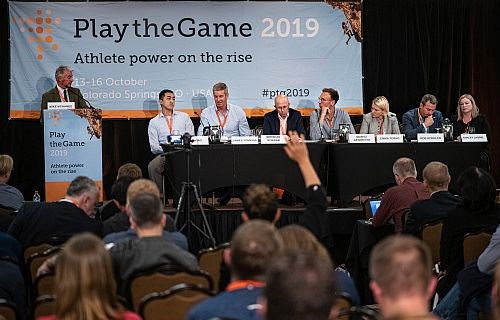Athletes' voices: breakthrough or breakdown?
The iconic image of African-American athletes Tommie Smith and John Carlos raising their black-gloved fists during the 1968 Olympics medal ceremony is perhaps the strongest image of athlete power. But in reality, Play the Game 2019 heard, many of today’s competitors are afraid to express their opinions. The structures generated by sports organisations often create a power imbalance that allows the interests of sponsors and administrators to take precedence.
Rob Koehler, Director General of the athlete-led movement Global Athlete, said that many athletes are unable to speak openly due to the structure of global bodies like the International Olympic Committee (IOC) and toothless athletes’ commissions.
“Retribution happens […]Our structures are forcing athletes to do things they don’t want to do,” Koehler said. Attempts to prevent athletes from criticising Nike’s Oregon project or the decision to reinstate Russia's anti-doping agency to the World Anti-Doping Agency (WADA), he said, were two recent examples: “If we want to empower the athletes, let us not silence them”.
Kohler gave his backing to Brendan Schwab, Executive Director of the World Players Association, who said that progress will be best-achieved through independent player unions. To achieve real change, he said, athletes unions must be fully independent, including financially independent, have the right to enter into collective bargaining and be able to appoint representatives without interference.
The U.S. Major League Baseball Players Association (MLBPA), Schwab pointed out, was transformed into one of the nation’s strongest unions under the stewardship of Marvin Miller. Under his leadership, the union oversaw a huge investment in player health and safety, the abolition of the maximum wage, the introduction of collective bargaining, and allowed players a cut of TV rights money.
Play the Game 2019 also heard the views of athletes’ representatives, all of whom claimed that athletes’ power is increasing. Moritz Geisreiter, board member of the independent German athletes body Athleten Deutschland, pointed out that his organisation has now become the primary voice of German athletes in politics and the media.“Personal development should be seen as just as important as athletic progress” he said. ¨
Han Xiao, Chair of the United States Olympic Committee’s Athletes' Advisory Council , said that an increasing number of athletes want to participate in sports governance, but those making lower and mid-level decisions need to learn to better engage with those on the field.Emma Terho, member of the IOC Athletes’ Commission, stressed that sport has great power to bring people together, and when athletes are given positions of power, they have a strong responsibility to use that power positively. Fellow Athletes’ Commission member James Tomkins said that athletes now enjoy good representation within the upper echelons of the IOC. “We’re trying to infiltrate those middle layers,” he said.
In more than 40 sessions, over 170 speakers will present their thoughts and oponions on a wide range of the most topical questions in world sport during the 11th Play the Game conference, taking place in Colorado Springs, USA, 13-16 October 2019.







